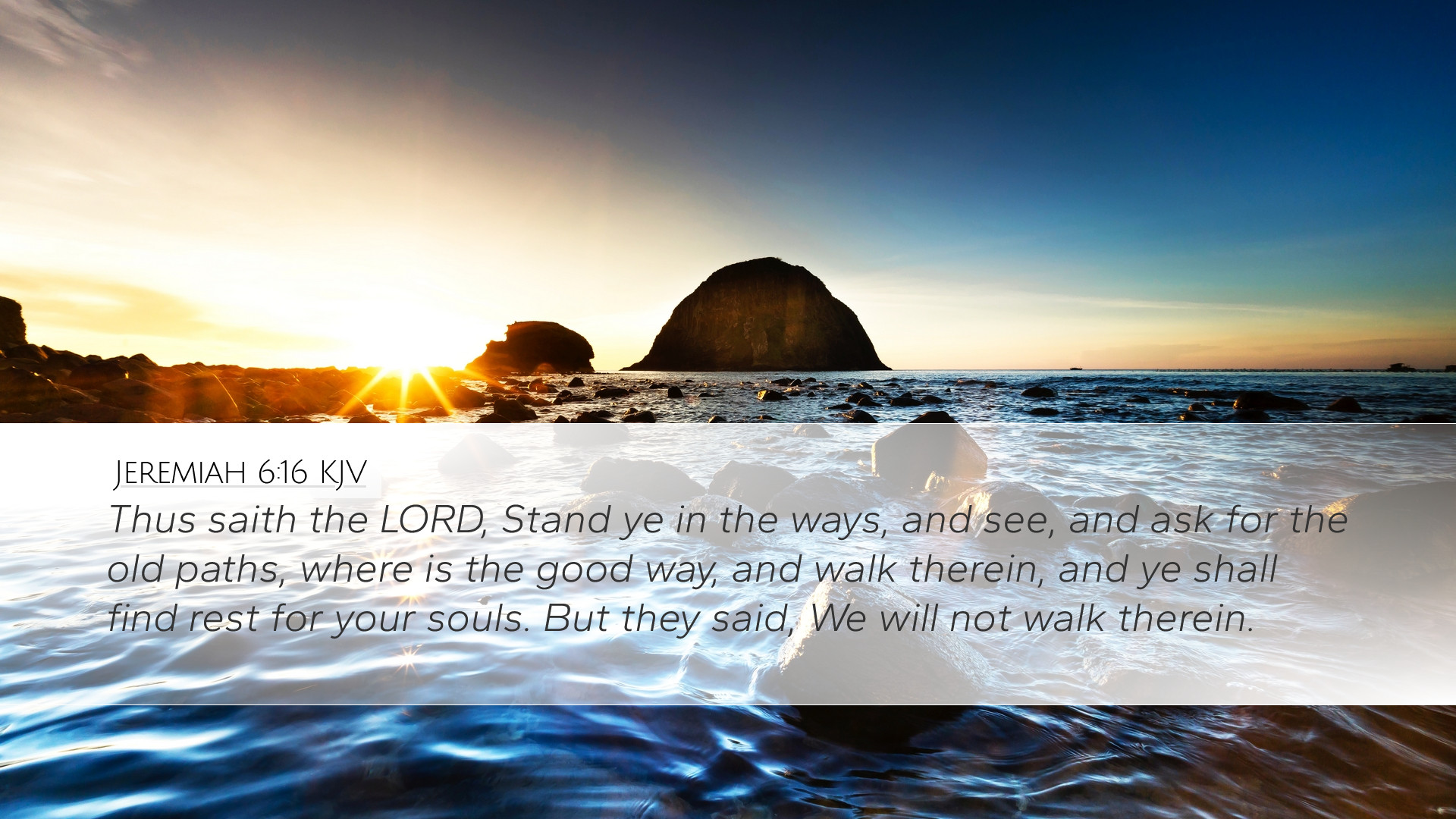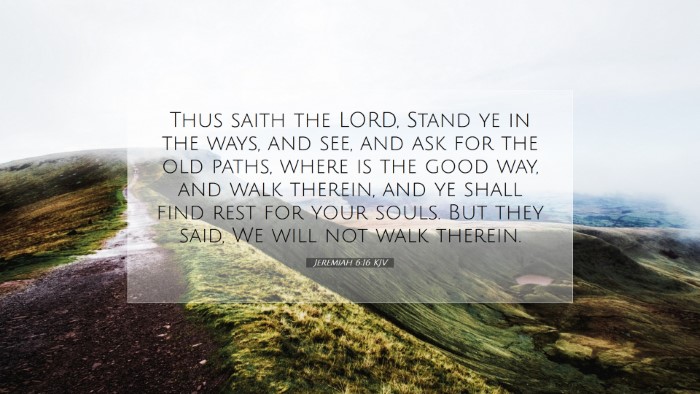Commentary on Jeremiah 6:16
Verse: "Thus saith the Lord, Stand ye in the ways, and see, and ask for the old paths, where is the good way, and walk therein, and ye shall find rest for your souls. But they said, We will not walk therein."
Introduction
This verse from Jeremiah 6:16 serves as a poignant invitation and challenge to the people of Judah during a critical time of moral decay and spiritual desolation. As reflected in the commentaries of Matthew Henry, Albert Barnes, and Adam Clarke, it encapsulates God's desire for His people to seek the ancient truths of His covenant and to find genuine peace within them.
Contextual Background
Jeremiah, known as the "weeping prophet," was called to prophesy during a time when Judah faced impending judgment due to their persistent sinfulness. This verse is part of God’s call to His people, encouraging them to return to the ways of righteousness. The historical context reveals the divided nation, the influence of pagan practices, and the urgency of a return to covenant faithfulness.
Divine Invitation: Stand Ye in the Ways
Matthew Henry emphasizes the action-oriented nature of God's call: “Stand ye in the ways.” This phrase signifies a posture of reflection and discernment. The “ways” are understood as paths of life choices—moral, spiritual, and civic. The instruction implies a deliberate pause, necessitating careful consideration of one's direction in life.
Seeking the Old Paths
Albert Barnes comments on the phrase "ask for the old paths," which indicates a diligent pursuit of the teachings and traditions that have sustained the faithful throughout generations. The "old paths" are symbolic of the steadfastness and durability of God's law. In a cultural context, this pursuit counters the innovation and moral relativism prevalent in society that lead individuals away from divine truth.
Finding the Good Way
The call to "walk therein" points to an active application of the truths found in the "old paths." Adam Clarke highlights that this is not merely an intellectual assent but denotes a lifestyle commitment to following God’s ways. The “good way” is described as one that leads to spiritual nourishment and rest for the soul, an important theological theme that signifies peace, tranquility, and fulfillment in God’s presence. This rest is echoed throughout scripture, resonating with the fulfillment found in Christ.
Human Rejection of Divine Guidance
The proclamation, "But they said, We will not walk therein," reveals the tragic resistance of the people against God's instruction. Matthew Henry astutely points out that this obstinate refusal demonstrates a heart unyielded to God’s call. The consequences of such rejection are profound, leading to spiritual ruin and societal disintegration. It serves as a warning for contemporary readers to not ignore the wisdom of God’s ways.
Theological Themes
- The Call to Discernment: God’s instruction to "stand" signifies the necessity of discernment in a world filled with conflicting ideologies.
- The Value of Tradition: The "old paths" symbolize not antiquated norms but timeless truths that uphold moral integrity and faithfulness.
- The Nature of Rest: Rest for the soul represents both an eschatological hope and a present reality for those who follow God's ways.
- Resistance to God’s Voice: The response of the people reflects a persistent struggle against divine authority, a theme recurrent in scripture.
Practical Application for Today
This verse calls pastors, students, theologians, and Bible scholars to reflect on their own lives and ministries. The challenge lies in asking whether they are truly standing in the ways God has prescribed. It invites a reconsideration of modern practices in light of biblical truth and an evaluation of whether contemporary choices align with the timeless “old paths” of scriptural fidelity.
In practical terms, the call to “walk therein” encompasses actionable steps for believers today:
- Engage in a thorough investigation of Scripture to understand God’s unchanging ways.
- Communicate the importance of scriptural truths within congregations and faith communities, encouraging a return to foundational principles.
- Model a life of obedience that reflects the peace and rest found in God, thereby attracting others to the “good way.”
- Acknowledge and confront modern-day distractions and false teachings that steer believers away from God’s direction.
Conclusion
Jeremiah 6:16 is not merely historical; it embodies an abiding truth relevant for every generation. As scholars and believers grapple with modernity’s complexities, they are reminded to pause and reflect on the paths they are walking. The gracious call to find rest in the Lord remains open, encouraging all to reach back to the "old paths" where true life and joy are found.


